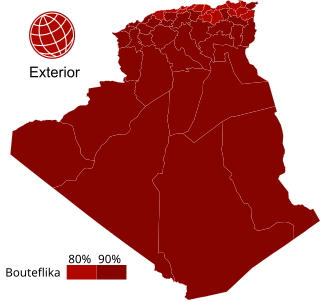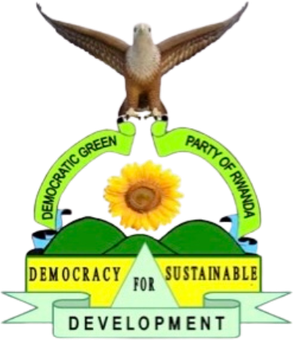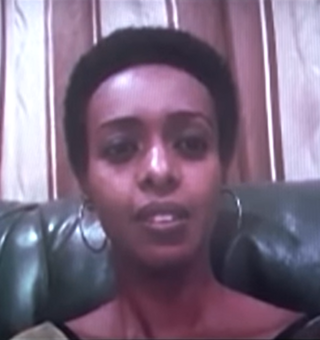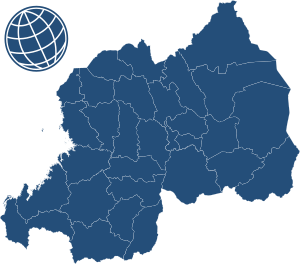
Rwanda is a de facto one-party state ruled by the Rwandan Patriotic Front and its leader Paul Kagame since the end of the 1994 genocide against members of the Tutsi ethnic group. Although Rwanda is nominally democratic, elections are manipulated in various ways, which include banning opposition parties, arresting or assassinating critics, and electoral fraud.

Paul Kagame is a Rwandan politician and former military officer who has been the President of Rwanda since 2000. He was previously a commander of the Rwandan Patriotic Front (RPF), a rebel armed force which invaded Rwanda in 1990. The RPF was one of the parties of the conflict during the Rwandan Civil War and the armed force which ended the Rwandan genocide. He was considered Rwanda's de facto leader when he was Vice President and Minister of Defence under President Pasteur Bizimungu from 1994 to 2000 after which the vice-presidential post was abolished.

Elections in Rwanda are manipulated in various ways, which include banning opposition parties, arresting or assassinating critics, and electoral fraud. According to its constitution, Rwanda is a multi-party democracy with a presidential system. In practice, it functions as a one-party state ruled by the Rwandan Patriotic Front and its leader Paul Kagame. The President and majority of members of the Chamber of Deputies are directly elected, whilst the Senate is indirectly elected and partly appointed.

The Constitution of Rwanda was adopted by referendum on May 26, 2003. It replaced the Constitution of 1991.

A referendum to confirm the presidential candidate Bashar al-Assad was held in Syria on 27 May 2007, after the People's Council of Syria unanimously voted to propose the incumbent for a second term on 10 May 2007.

Presidential elections were held in Algeria on 9 April 2009. The result was a victory for incumbent President Abdelaziz Bouteflika, who was re-elected with 90% of the vote.

Presidential elections were held in Rwanda on 9 August 2010, the second since the Rwandan Civil War. Incumbent President Paul Kagame of the Rwandan Patriotic Front (RPF) was re-elected for a second seven-year term with 93% of the vote.

The Democratic Green Party of Rwanda is a green political party in Rwanda, established in 2009. The party was registered in August 2013, but too late to contest the 2013 parliamentary elections. Its platform emphasizes unity, non-violence, social justice, participatory democracy, and calls for subsidized prices for agricultural produce. It believes that the unalienable rights of the people include "the right to life, liberty, peaceful assembly, expression, worship and the pursuit of happiness", and that these rights are granted by God.
Jean-Damascène Ntawukuriryayo is a Rwandan politician who served as President of the Senate of Rwanda from 2011 to 2014. He also served as Minister of Health in Rwanda. He became President of the Senate in October 2011, and also served for a time as Vice-President of the Chamber of Deputies.

Local elections were held in Manila on May 13, 2013, within the Philippine general election. The voters elected for the elective local posts in the city: the mayor, vice mayor, the six congressmen, and the councilors, six in each of the city's six legislative districts.

This national electoral calendar for 2015 lists the national/federal elections held in 2015 in all sovereign states and their dependent territories. By-elections are excluded, though national referendums are included.

Presidential elections were held in Benin on 6 March 2016, having been delayed by one week due to logistical constraints. Incumbent President Thomas Boni Yayi was at the end of his second presidential term and was constitutionally barred from running for a third. The elections grabbed the interest of many of the country's top businessmen, resulting in over 30 candidates trying to run for the presidency. A second round was held on 20 March, in which businessman Patrice Talon defeated Prime Minister Lionel Zinsou.

A constitutional referendum was held in Rwanda on 18 December 2015. Rwandans living abroad voted on 17 December. The amendments to the constitution would allow President Paul Kagame to run for a third term in office in 2017, as well as shortening presidential terms from seven to five years, although the latter change would not come into effect until 2024. They were approved by around 98% of voters.

Presidential elections were held in Egypt between 26 and 28 March 2018, though Egyptians abroad voted from 16 to 18 March 2018. On 19 January, incumbent President Abdel Fattah el-Sisi formally announced he would run for a second and final term. El-Sisi won the election with 97%, according to the official results. A runoff would have taken place 19 to 21 April outside the country and 24 to 26 April within the country if no candidate had reached 50% of the vote. The election had a turnout of roughly 41%, lower than the 2014 election's 47%. A 2019 constitutional change allowed El-Sisi to remain in power until 2030 instead of 2022.

Presidential elections were held in Kyrgyzstan on 15 October 2017. Incumbent President Almazbek Atambayev was not allowed to run again because the constitution sets a single six-year term for the head of state. Eleven candidates registered for the race, and from this field Sooronbay Jeenbekov of the Social Democratic Party of Kyrgyzstan won more than 50% of the vote, avoiding a runoff. Following certification of the results on 30 October, Jeenbekov was inaugurated as President of Kyrgyzstan on 24 November.

Presidential elections were held in Ivory Coast on 31 October 2020. Incumbent president Alassane Ouattara was re-elected with 95% of the vote amidst an opposition boycott.

Diane Shima Rwigara is a Rwandan businesswoman and accountant who stood as an independent candidate in the 2017 Rwandan presidential election. Rwigara was charged on 23 September 2017, alongside her mother and four other defendants, with "inciting insurrection" among other counts, but was acquitted along with her mother on 6 December 2018.
Since the end of the Rwandan Civil War, many forms of censorship have been implemented in Rwanda.

General elections were held in Rwanda on 15 July 2024 to elect the president and members of the Chamber of Deputies.

















